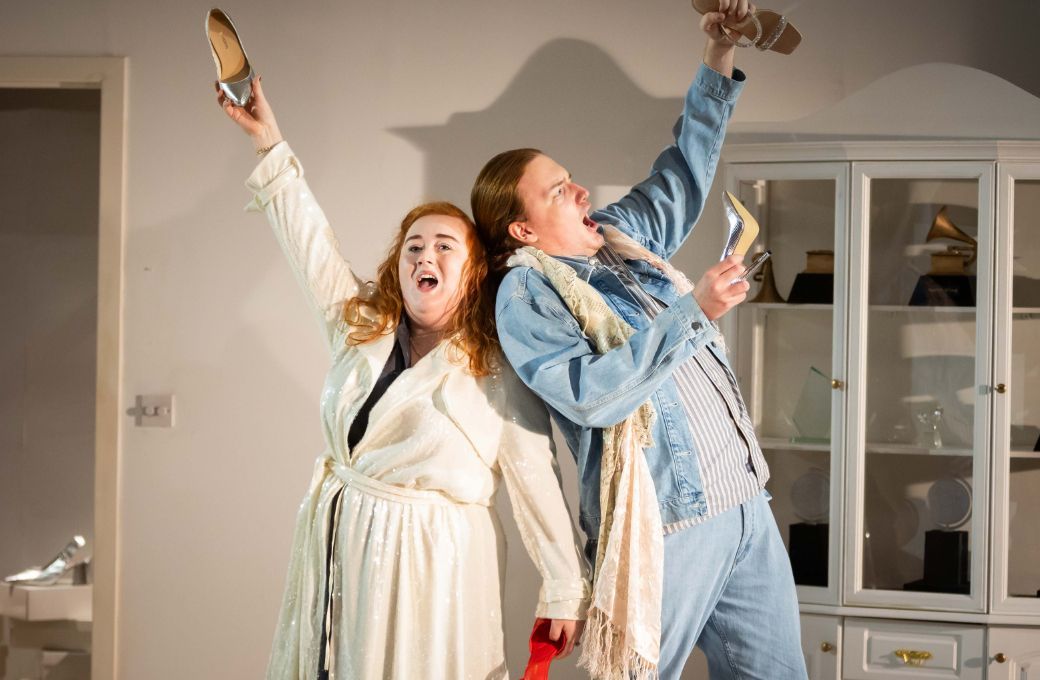An intriguing double bill of American Opera from the Royal Conservatoire of Scotland focussed on two very different women who each create a world of convenient truths. The clients visiting Madame Flora’s séance in Gian Carlo Menotti’s The Medium truly believe that they are in communication with their lost children, and the grown-up children in Jake Heggie’s Three Decembers are convinced by their mother’s tale of their father’s death in a car crash. In these two incredibly powerful short works, beliefs shatter with devastating consequences.

Three Decembers is a disturbing and passionate three-hander, beginning gently as Beatrice and Charlie mull over their mother Madeline’s latest Christmas letter in 1986. There is a lot of family business to unpack as actress and Broadway star Maddy writes home from her Caribbean holiday. We don’t meet Bea’s husband Syd or their children, nor Burt, Charlie’s partner who is ill with Aids, whom Maddy has never accepted, but both siblings resent the long absences of their mother in a childhood marked by a succession of nannies and other people’s parents. By 1996, Burt has died, Maddy is up for a Tony Award and Bea is trying to hold her marriage together while struggling with a drink problem. While the children barely remember their father, Maddy gets the colour of the car in the fatal crash wrong, and in a spectacular tirade, longstanding dark secrets emerge. In December 2006, Maddy has passed on and Bea and Charlie read a eulogy. Time has healed and although scars remain, Bea finally understands that her mother had to create a convenient truth because the reality was simply too terrible.
Heggie’s 2008 work, based on the play by Terrence McNally and broadly scored for a busy 10-piece chamber orchestra, might verge on the schmaltzy in parts, but was delivered by three singers who completely inhabited their roles with steely edge, given fluid momentum in Matthew Eberhardt’s direction. William Cole’s conducting was splendid, easing every nuance from his players with some lovely solo work and dense ensembles. Flora Birkbeck as Maddy, living her stage life and harbouring dark secrets, was excellent, her sweetly rich mezzo especially showcased in the number from her show “Daybreak”. Baritone Paweł Piotrowski was a sensitive Charlie, desperately seeking maternal approval; soprano Rosie Lavery gave a storming performance as Bea in a choppy mother-daughter relationship. In the studio setting with the players to one side and an effective sparse set from Anna Yates, the singers built the tension brilliantly in a moving emotional rollercoaster.
There are few truly shock-horror operas, but Menotti’s 1946 work The Medium can pack a punch. The opera was based on a true-life incident when a sceptical Menotti attended a séance where a baroness communicated nightly with her dead daughter. Here, Madame Flora lives with her daughter Monica and Toby, a mute boy “rescued from the streets of Budapest”. Flora runs séances for clients wishing to contact the other side, shamelessly using Monica and Toby to stage manage fake movements, voices and flickering lights. While her clients believe absolutely what they see and hear, Flora feels a strange hand clutching her throat during a session and the real spirits take over. Birkbeck returned as Madame Flora, here brilliantly depicting a dangerously unpredictable woman living life on the edge. Soprano Nikki Martin’s sweet-voiced Monica tried to calm things with her lullaby “the black swan” but Flora repeatedly snapped at vulnerable Toby (Daniel Gray Bell in a mute role), who is mostly cowering in corners. Lavery and Piotrowski were joined by Charlotte Bateman as an excellent trio of bereaved parents but even when Flora reveals her sessions are a fake, they would rather believe the lies than face reality. Flora is convinced that Toby touched her and becomes increasingly deranged, a monster shooting at shadows.
William Cole, conducting a slightly larger chamber orchestra, tackled the dense score brilliantly, two pianists in duet hammering out the fateful opening chords, setting the grim scene. Moments of lullaby beauty and Monica’s waltz lightened proceedings, but Cole carefully built the tension, balancing singers and players perfectly.
Was Toby a mute with a heightened sense of “the other” who could not speak, or could he speak but chose not to do so? I was looking for the former and the possibility that the real spirits were using Toby to drive Flora to madness, which is even more shocking. The minimal set did not work quite so well here and if ever an opera needed real gunshots on stage, this is one. Flora’s final question to Toby, “was it you?” was certainly a chilling end, but we knew the answer.
Studio chamber opera is an intimate experience for performers and audience. Here emerging singers and players created a thrillingly taut evening, finely done.


